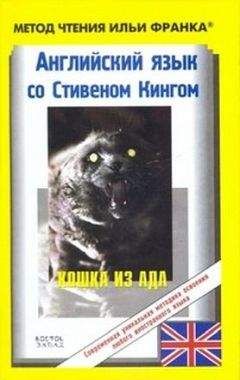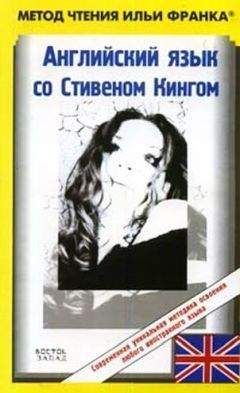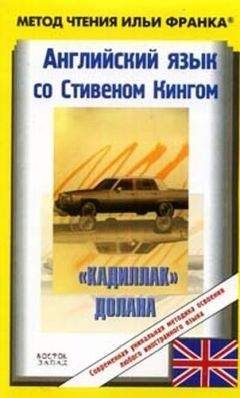Stephen King - Английский язык с Стивеном Кингом "Дети кукурузы
“Wehaveadeadchildinthetrunkofourcar (у нас мертвый ребенок в багажнике нашей машины; trunk— ствол /дерева/; сундук, чемодан; багажник /автомобиля/)!” he roared at her (заорал он на нее), and took a distinct pleasure (и получил явное удовольствие; totake— брать, хватать; получать, извлекать; distinct— отдельный, особый; отчетливый; определенный, явный) at the way she flinched (от того, как она вздрогнула), the way her face crumbled (и изменилась в лице: «как ее лицо рассыпалось»; tocrumble— осыпаться; разваливаться на части).
crumble ['krAmbl], distinct [dIs'tINkt], pleasure ['pleZq]
“Vicky,” he said.
“I want to get out of here, Burt.”
“Vicky, listen to me.”
“Turn around. Let's go.”
“Vicky, will you stop a minute?”
“I'll stop when we're driving the other way. Now let's go.”
“We have a dead child in the trunk of our car!” he roared at her, and took a distinct pleasure at the way she flinched, the way her face crumbled.
In a slightly lower voice he went on (немного понизив голос: «слегка более низким/тихим голосом» он продолжал):
“His throat was cut (его горло было перерезано) and he was shoved out into the road (его вытолкнули на дорогу) and I ran him over (и я переехал его). Now I'm going to drive up to the courthouse (и теперь я собираюсь поехать к зданию суда) or whatever they have here (или что тут у них есть), and I'm going to report it (и я собираюсь сообщить об этом). If you want to start walking towards the pike (если тебе хочется отправиться пешком к магистрали), go to it (приступай; to gotoit — энергичноприступатькчему. л.). I'll pick you up (я тебя /потом/ подберу; topickup— поднимать, подбирать; брать пассажира, подвозить). But don't you tell me to turn around (но не говори мне /что я должен/ развернуться) and drive seventy miles to Grand Island (и ехать семьдесят миль до Грэнд-Айленда) like we had nothing in the trunk but a bag of garbage (как будто у нас в багажнике ничего нет, кроме мешка с мусором; garbage— /кухонные/ отбросы; остатки, гниющий мусор). He happens to be some mother's son (он ведь чей-то сын: «он, кстати, является сыном какой-нибудь матери»; tohappen— случаться, происходить; tohappen to be smb., smth. — оказаться, быть кем-либо, чем-либо; каким-либо), and I'm going to report it (и я собираюсь заявить об этом) before whoever killed him gets over the hills and far away (раньше, чем тот, кто убил его успеет уйти слишком далеко: «переберется через холмы и /уйдет/ далеко»; whoever— кто бы ни, который бы ни; любой; over the hills and far away ≈ за тридевять земель; на край света /впервые встречается у английского поэта и драматурга Дж. Гея /1688-1732/ в комедии “Опера нищих” /The Beggar's Opera/).”
“You bastard (ты ублюдок; bastard— внебрачный ребенок; ублюдок),” she said, crying (плача). “What am I doing with you (что я /тут/ делаю с тобой)?”
“I don't know (я не знаю),” he said. “I don't know any more (я больше не знаю). But the situation can be remedied, Vicky (но ситуация может быть исправлена, Вики; remedy— средство от болезни, лекарство; toremedy— излечивать; исправлять /положение, дело/).”
shove [SAv], bastard ['bxstqd], remedy ['remIdI]
In a slightly lower voice he went on:
“His throat was cut and he was shoved out into the road and Iran him over. Now I'm going to drive up to the courthouse or whatever they have here, and I'm going to report it. If you want to start walking towards the pike, go to it. I'll pick you up. But don't you tell me to turn around and drive seventy miles to Grand Island like we had nothing in the trunk but a bag of garbage. He happens to be some mother's son, and I'm going to report it before whoever killed him gets over the hills and far away.”
“You bastard,” she said, crying. “What am I doing with you?”
“I don't know,” he said. “I don't know any more. But the situation can be remedied, Vicky.”
He pulled away from the curb (он отъехал от бордюра). The dog lifted its head at the brief squeal of the tyres (пес поднял голову, услышав короткий визг шин) and then lowered it to its paws again (и затем снова опустил ее на лапы).
They drove the remaining block to the square (они проехали последний квартал оставшийся до сквера). At the corner of Main and Pleasant (на углу Главной и Радостной; pleasant — приятный, радостный), Main Street split in two (Главная улица разделилась на две; split — раскалывать; расщеплять, разбиватьначасти). There actually was a town square (здесь, в самом деле, была городская площадь), a grassy park with a bandstand in the middle (покрытый травой парк/сквер, с эстрадой для оркестра в центре; grass — трава). On the other end (на другом конце), where Main Street became one again (/там,/ где Главная улица снова соединилась: «становилась одной»), there were two official-looking buildings (стояли два похожих на служебные/казенные: «официально выглядящие» здания). Burt could make out the lettering on one (смог разобрать надпись на одном): GATLIN MUNICIPAL CENTER (“Муниципальный центр Гатлина”).
“That's it (вот оно),” he said. Vicky said nothing (Вики ничего не сказала).
Halfway up the square (проехав половину площади: «полдороги вверх по площади»), Burt pulled over again (Берт снова остановил машину у края дороги). They were beside a lunch room (они находились рядом с закусочной; lunch— обед, ланч), the Gatlin Bar and Grill (“Гатлинский гриль-бар”).
squeal [skwJl], pleasant ['pleznt], municipal [mjH'nIsIpql]
He pulled away from the curb. The dog lifted its head at the brief squeal of the tyres and then lowered it to its paws again.
They drove the remaining block to the square. At the corner of Main and Pleasant, Main Street split in two. There actually was a town square, a grassy park with a bandstand in the middle. On the other end, where Main Street became one again, there were two official-looking buildings. Burt could make out the lettering on one: GATLIN
MUNICIPAL CENTER.
“That's it,” he said. Vicky said nothing.
Halfway up the square, Burt pulled over again. They were beside a lunch room, the Gatlin Bar and Grill.
“Where are you going (куда ты идешь)?” Vicky asked with alarm as he opened his door (спросила Вики с тревогой, когда он открыл свою дверцу).
“To find out where everyone is (выяснить, куда все подевались: «где все»). Sign in the window there says “Open” (на табличке в окне написано “открыто”).”
“You're not going to leave me here alone (ты /ведь/ не собираешься оставить меня тут одну).”
“So come (ну так идем). Who's stopping you (кто тебе не дает: «кто тебя останавливает»)?”
She unlocked her door and stepped out (она открыла дверцу и выбралась из машины; lock замок; запор; блокировочное устройство; tolock— запирать; tostepout— выходить /особ. не на долго/; step— шаг) as he crossed in front of the car (пока он обошел машину спереди). He saw how pale her face was (он увидел, насколько бледным было ее лицо) and felt an instant of pity (и на мгновение почувствовал /к ней/ жалость: «почувствовал мгновение жалости»). Hopeless pity (отчаянную жалость; hopeless— безнадежный; отчаявшийся).
“Do you hear it (ты слышишь)?” she asked as he joined her (спросила она, когда он подошел: «присоединился к ней»).
“Hear what (слышу что)?”
“Where are you going?” Vicky asked with alarm as he opened his door.
“To find out where everyone is. Sign in the window there says “Open”.”
“You're not going to leave me here alone.”
“So come. Who's stopping you?”
She unlocked her door and stepped out as he crossed in front of the car. He saw how pale her face was and felt an instant of pity. Hopeless pity.
“Do you hear it?” she asked as he joined her.
“Hear what?”
“The nothing (тишину: «ничто»). No cars (ни машин). No people (ни людей). No tractors (ни тракторов). Nothing (ничего).” And then, from a block over (тогда, в соседнем квартале; overуказываетнаположениеподругуюсторонучего-либо), they heard the high and joyous laughter of children (они услышали высокий = звонкий, радостный детский смех; joy — радость, счастье; восторг).
“I hear kids (я слышу детей; kid— козленок; разг. ребенок, малыш),” he said. “Don't you (ты разве нет)?”



